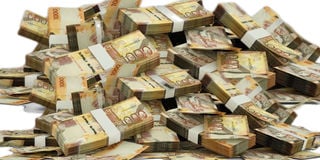
Public procurement offers one of the largest business opportunities in Kenya with up Sh1.885 trillion or 13 percent of the value of the economy being built through the supply of goods and services to government.
Public procurement offers one of the largest business opportunities in Kenya with up Sh1.885 trillion or 13 percent of the value of the economy being built through the supply of goods and services to government.
The lucrative business has for long been seen as the playing ground for corrupt and unethical individuals and businesses who have been swaying tenders their way and even influencing who gets paid first from the ever-strained exchequer.
And now government is promising to overcome this hurdle with the full roll out of electronic government procurement (e-GP) system, which last week received the blessings of the Cabinet after years in the making.
E-GP is the use of information technology by government in conducting their procurement activities with suppliers for the acquisition of works, goods, and consultancy services required by the public sector. The system is seen as the answer to all that is wrong with public procurement including weak procurement planning and contract management, long turnaround time in concluding procurement processes, delays in payment of performed contracts, weak records management and weak oversighting.
Treasury’s Public Procurement Department says full implementation of the e-GP system will deliver savings of about approximately 10 percent to 15 percent of government’s public procurement expenditure, with the saving within the first year of its implementation being put at about Sh80 billion.
E-GP, which was developed by an international contractor working with a local firm, will be expected to excel on a ground where the Integrated Financial Management Information System (Ifmis) electronic procurement system that was launched in 2015 struggled to leave a mark.
Treasury told this publication the IFMIS e-procurement only supported two methods of procurement as was in the Public Procurement and Disposal Act, 2005 and could not achieve much with the 2010 constitution leading to a new Act that allowed about 13 different procurement methods.
Now, the Treasury believes the solution lies in the new system. Its rollout is coming at a time thousands of contractors and suppliers are for instance facing extensive delays in payment, with pending bills from national government having surged to a record Sh630.6 billion as at end of September last year. Pending bills of counties stood at over Sh163.6 billion in the same period.
The fortunes of the affected contractors and suppliers are tied in the hands of a pending bills verification committees at both national and county level. The committees are combing through thousands of documents to decide what is genuine or not—a pointer that there have been gaps in the oversight of the procurement process. Treasury says the new system will not allow for procurement of anything that is outside the submitted and approved procurement plan in line with the budget, helping address the issue of pending bills going forward. “The system will be able to secure the budget funds before moving to the next step of submission of invitation for quotations or tenders. One of the problem we have had with pending bills has been people doing procurement outside the official procurement plan,” said the Treasury.
“One of the modules in this new system is the procurement plan so that as you commence your procurement process, it will raise a red flag is something outside the procurement plan is attempted.” Government has disclosed to the International Monetary Fund (IMF) that is currently piloting the new e-GP system in 12 ministries, departments, and agencies (MDAs) as it gears for full rollout in the coming months. “Roll-out of the entire system to all MDAs will be from July 2024. We are looking forward to necessary support from the World Bank especially in the area of capacity building of the system users in procuring entities and within business community,” says Treasury.
Among the 12 entities piloting with the new system are big procuring entities like Kenya Electricity Generating Company and Moi Teaching and Referral Hospital. The process is at the user acceptance testing phase. To allow a seamless transition, Treasury says it has updated the IFMIS, allowing procuring entities to continue using the IFMIS e-procurement module until the e-GP system is fully rolled out. “The developed e-GP system will be interfaced with our IFMIS to process payments of contracted suppliers,” says the Treasury. The system has also been integrated with other key systems including Kenya Revenue Authority’s i-Tax system, Business Registration Service, Integrated Population Registration Services (BRS) system, National Construction Authority Contractor system, and Access to Government Procurement Opportunities system.
Treasury says it is liaising with the ICT Authority and other key government offices like KRA will ensure all the documents such as tax records, identity of bidders and the history of their company as submitted by bidders are authenticated.
Such integration will ensure only registered business can do business with government and the taxman is also able to be in the loop and get the taxes dues. Businesses that have been dithering on declaring the beneficial owners to the BRS but want to continue trading with government, will also be easily identified. “Once we automate our processes, the issues of audit trails is going to be very key. Once you submit a bid, it goes on record. You cannot delete it or raise it. That is a critical component,” says the Treasury.
The new system will also eliminate internal manual approval procedures. Everything will be approved online, clearly leaving a trail on who approved and when. Such a trail will also be handy for the office of Auditor General. The Cabinet sees the e-GP system injecting the much-needed transparency and accountability, with those doing business with government hoping that it will also lead to timely processing of payments. Effective July 1, this year, all ministries, state departments, and county governments are expected to have to have fully transitioned to this system.
“The e-GP system is anticipated to increase the ease of bidder participation, translating to savings on public procurement spending realised from lower bid prices due to open competition,” states the Cabinet. The system is expected to improve the integrity of public procurement, relying on features such as online submission and evaluation of bids, approval, and award of contracts, thereby reducing external influences.
It also comes with capabilities of preserving all procurement documents and transactions online for audit purposes, validating bidders’ information and also allows for online submission and tracking of complaints. With e-GP information being in soft copy, there will be reduction of archival and storage costs, paper consumption and reduced need to use hard copies due to use of email. The e-GP system is majorly template-driven and all the templates will be loaded in the system, standardising all transactions and therefore reduced errors in process and documentation.
Public Procurement Regulatory Authority, which among other roles hears and determines appeals on award of tenders, says a well-functioning public procurement will help improve service delivery and also stimulate businesses trading with government.
“As the Authority in charge of regulation of the public procurement and asset disposal system in Kenya, we recognize the importance and value that a well-functioning public procurement system can create to both the citizens in terms of enjoyment of quality services and to the private sector through growth and creation of employment opportunities,” states PPRA.
Treasury has already held consultative meetings with the Kenya Bankers Association, Association of Kenya Insurers and PPRA to develop system requirement specification document for the e-bid security and guarantee management module. “You will not have to go to your bank and ask for bid security. All these things will be online. The system is integrating with the banking community so that one is able to apply for bid security online. You don’t have to be running around with papers,” says the Treasury.
Bringing banks in the picture means the system will be able to avoid instances where some successful bidders are unable to deliver on their contracts because of winning tenders without having authentic bid security. Treasury hopes that it is going to see increased participation in bids and therefore get the lowest possible bids as suppliers from far flanged areas come on board thanks to a digital process that eliminates distance barrier and the paper-work.
“With a higher bidder participation, chances of increased competition are high and we should be able to see competitive prices especially on the common user items. This way, the public will get value for money,” says the Treasury.
The open availability of information promotes equal access for all types of businesses, including small and medium enterprises, by reducing the possibility of large or well-connected firms gaining an advantage because of information asymmetries.
Kenya will be joining the growing list of countries using the system, including the neigbouring Tanzania that has also set July 1 as the date of shifting from their current procurement system. Rwanda in July 2017, rolled out its e-GP system called UMUCYO, which means “transparency” in the local language, becoming the first African country with an electronic procurement system. The project, whose planning started in 2014, was supported by World Bank.
Uganda has already started implementing while Ethiopia, which had made the shift, were thrown back to the drawing board after running into challenges with the contractor of the system.







